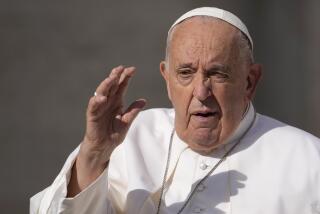The condom conundrum
- Share via
The international controversy generated by leaks from German journalist Peter Seewald’s book-length interview with Pope Benedict XVI — officially issued this week as “Light of the World” — may be a publicist’s dream, but what does it really signify?
Benedict’s thoughts on the morality of condom usage don’t go nearly as far as those of us who feel that the Roman Catholic Church’s absolute prohibition of artificial contraception is a moral disaster would like, but they push church doctrine a good bit further than the traditionalists want to acknowledge.
Here’s the pope’s controversial remark, which came in response to a question about the use of condoms to prevent the spread of AIDS in Africa: “There may be a basis in the case of some individuals, as perhaps when a male prostitute uses a condom, where this can be a first step in the direction of a moralization, a first assumption of responsibility, on the way toward recovering an awareness that not everything is allowed and that one cannot do whatever one wants.”
If you’re having difficulty parsing that, there’s no need to adjust your set. To understand what’s being said, it’s important to remember that Benedict is, in a formal academic sense, the most rigorously trained and sophisticated theologian to occupy the throne of Peter in many centuries. It’s also important to recall that, in Catholic moral reasoning, intention is crucial when it comes to assessing the quality of an individual act.
Theology may be — as was said in the High Middle Ages — the “queen of the sciences,” but unlike physical science, it does not proceed by experimental proofs. Thus, theologians love thought problems such as the one the pope posed and answered here.
All the back and forth over translations, including whether he meant to make a point that applied only to gay sex, is irrelevant, particularly because he subsequently said through his Vatican spokesman that his point also applied equally to female and transsexual prostitutes. That point does not involve the permissibility of condom use per se; rather, the pontiff is arguing that if an HIV-positive person put on a condom so as not to infect a partner, the act could indicate the first moral stirrings of a desire to behave more responsibly.
The reason this remark, which must seem self-evidently sensible to most people, went off like a bomb among Catholics is that, for years, Catholic bishops, theologians and healthcare workers fighting sub-Saharan Africa’s AIDS epidemic have urged such a view and received either stony silence or condemnation from Rome. In fact, as prefect of the Congregation for the Doctrine of the Faith, Cardinal Joseph Ratzinger ordered the suppression of a book by two Jesuit theologians arguing the morality of using condoms to halt AIDS transmission. In his remark, Benedict at the very least reopened the door to a discussion of the matter. That’s obvious if you look at the actual question from Seewald that evoked the thought problem:
“On the occasion of your trip to Africa in March 2009, the Vatican’s policy on AIDS once again became the target of media criticism…. In Africa you stated that the church’s traditional teaching has proven to be the only sure way to stop the spread of HIV. Critics, including critics from the church’s own ranks, object that it is madness to forbid a high-risk population to use condoms.”
Some clerics and Catholic health workers long have argued that telling HIV-infected patients, particularly those married to an uninfected partner, not to use condoms essentially turns normal conjugal relations into a suicide pact. These advocates may find new encouragement in Benedict’s musings.
But for those who believe that Pope Paul VI’s 1968 reaffirmation of the church’s condemnation of artificial contraception, including condoms, began a process of estrangement that fundamentally alienated millions of Catholics from the church, there’s really nothing new in Benedict’s remarks.
Elsewhere in the interview, the pope explicitly endorsed Paul VI’s encyclical on the question, Humanae Vitae, and calls Paul’s stance “prophetic.” As this pope sees it, “The basic lines of Humanae Vitae are still correct.”
More to Read
Sign up for Essential California
The most important California stories and recommendations in your inbox every morning.
You may occasionally receive promotional content from the Los Angeles Times.













